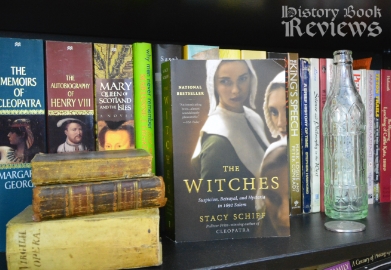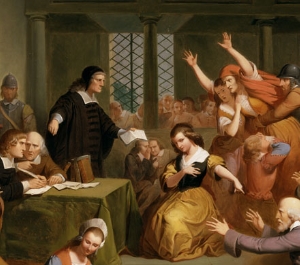The Witches: Suspicion, Betrayal, and Hysteria in 1692 Salem
by Stacy Schiff

Review
We have all heard of the Salem Witch Trials of 1692, when fourteen women and five men (as well as two dogs) were executed for witchcraft. But how many of us can say that we have been there, squinting in the smoky dark meeting house where the trials were held, smelling the wet ash and the acidity of fresh pressed cider, and seeing the fear of the accused as they are taken to the gallows? Miraculously, after reading Schiff's The Witches I think I can say that I have.
Honestly this book was so magical that if we lived in 1692 I think Stacy Schiff would be hanged as a witch. It was utterly unlike any other history book I have ever read, to my great surprise and delight. It felt like Schiff was writing directly to me--it was raw, honest, conversational history that was written in a way that made me feel like I was living it. Consequently, throughout the whole book I was filled with an impotent rage and frustration that actually made me curse out loud, and harass all my friends and family with the details, trying to figure out why ON EARTH this tragedy happened and what the f*** was wrong with the people of Salem.
The Salem witch trials are universally known, the events of 1692 historically famous, yet the details are little known by the general public. The things I read in The Witches actually blew my mind, and I cannot believe I never knew them before. One of the more shocking facts...the entire ordeal was created and perpetuated by teenage girls! They thrashed around and acted strangely, complained of being bitten by spectral figures, and then named names. This appeared to be contagious, as people by the dozen began falling prey to the same affliction, most of them pre-teen or teenage girls as well. As the trials and even executions got underway, these girls would stand in the court and look the woman (or man) they accused in the eye, and swear they were witches. Knowingly sending them to their deaths for something they must have known wasn't true. But that wasn't even the most mind-boggling thing: Many of the accused actually confessed willingly. Many confessed to things that had happened after they were put in prison, so it obviously wasn't genuine. But why????

The witch trial of George Jacobs, painted by Thompkins H. Matteson in 1855.
There is honestly WAY too much amazing content and detail in this book to even begin to summarize. Schiff explores the whole phenomenon from beginning to end in brilliant detail, painting a remarkably vivid picture of Salem in 1692 and the forces that overcame the town. Fascinatingly, most of the book is written in the perspective of people from that time, and reading it made me feel like I was living in 1692, experiencing the whole thing myself. There was very little analysis or removed historical perspective, which was very unique. On one hand it was frustrating because I desperately wanted to know the modern explanation and scientific theories for what happened, but on the other it was quite wonderful to be placed so intimately inside the history that I could almost feel it. That is something that is incredibly difficult to achieve, and Schiff did this beyond my wildest dreams.
Frankly, it's hard to believe that anyone in Salem really believed in what was happening. I think they really did believe in the idea of witches, but their perception of what characterized a witch was very bizarre. Here are the basics of what I learned: Witches love to perch on exposed ceiling beams, tip hay out of wagons, enchant bags of corn and pails of beer, bake witch-cakes, turn into blue boars and scurry mischievously under horse hooves, and conjure glow-in-the-dark jellyfish. You can always tell someone is a witch if they walk soundlessly over loose floorboards, spin suspiciously fine linen, culture uncommonly good cheese, and, my personal favorite, smell figs in other people's pockets. Let's be honest, there MUST be better uses for magical powers than this. Sure, it's all in good fun to bewitch skillets and food products and keep cats disguised as toads, but I'm just saying, I would sure be disappointed if I sold my soul to the Devil and those powers were my only reward.
The sad and truly baffling fact is that people accepted this literally based on the stories told by 11-year old girls, and sent people to their deaths based on imaginary crimes. Husbands accused wives, daughters accused mothers and grandmothers, brothers and sisters accused each other. The oldest to be accused was a woman of nearly 80, the youngest a girl only five years old, who was chained in prison for nine months. This was a world where confessed witches were spared but people who claimed innocence were put to death. It was a world where it was as sure sign of witching if you couldn't recite the Lord's Prayer blunder-free--but also if you could. This was hysteria, panic, chaos, absolute bedlam. It was maddening to read about, but completely addictive. There is good reason to call Salem our "national nightmare," and this book proves it.
This book was masterful and special, and I loved it more than I can say. In the end Schiff did offer some historical analysis of what happened, but I was still left desperately trying to seek a rational explanation that made sense. The Witches is compelling, infuriating, and powerful, brilliantly recounting the history of the Salem witch trials in intimate and personal detail, perhaps more than we might be comfortable remembering. It is a work of art, and a good lesson to always keep your best linen and cheese for yourself. And for heaven's sake, if you smell a fig in someone's pocket, just don't bring it up.



